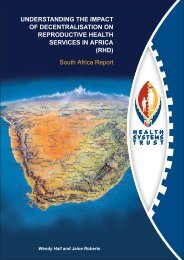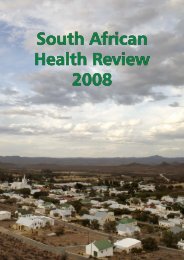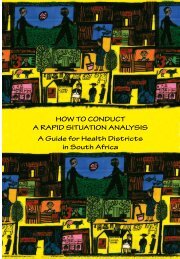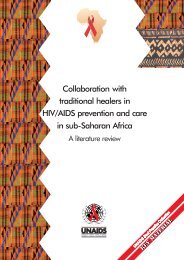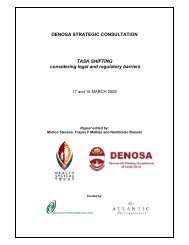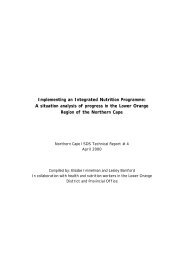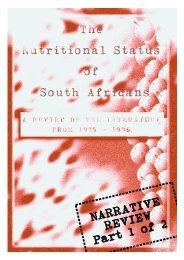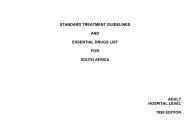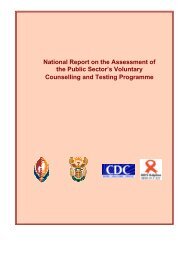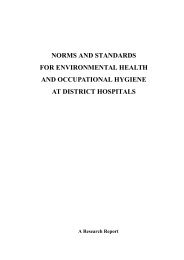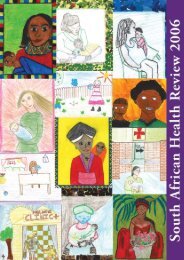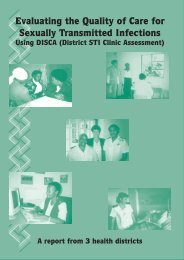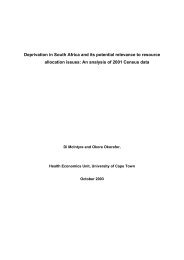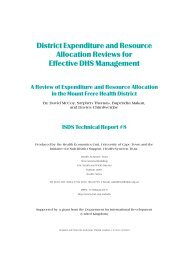SAHR 2007 - Health Systems Trust
SAHR 2007 - Health Systems Trust
SAHR 2007 - Health Systems Trust
Create successful ePaper yourself
Turn your PDF publications into a flip-book with our unique Google optimized e-Paper software.
Recommendations<br />
The informal sector does not respond well to regulation<br />
and consequently regulation alone is unlikely to improve<br />
the traditional medicines industry and the associated health<br />
care for the millions of consumers in South Africa. In addition<br />
to regulation, incentives need to be established that<br />
promote the development of appropriate technology in<br />
wild plant harvesting, farming, storage, packaging, dosage<br />
and treatment that encourages the current market players to<br />
participate in the development of their own industry. These<br />
incentives should be established by the various tiers of government<br />
by way of bursaries, research funds, safe and hygienic<br />
market infrastructure development, developing processing<br />
facilities and easy access to clean packing. Furthermore,<br />
local and foreign pharmaceutical manufacturers need to be<br />
encouraged to invest in the South African traditional medicines<br />
sector by ensuring that investors can secure the ownership<br />
rights of the technologies developed. Encouraging the<br />
laissez faire manufacturers to invest in product improvement<br />
will be a challenge, where currently they operate outside of<br />
formal regulation and compete with both the pharmaceutical<br />
manufacturers and the current market traders.<br />
References<br />
1 Mander M. Marketing of Indigenous Medicinal Plants in<br />
South Africa. A case study in KwaZulu-Natal. Rome: Food and<br />
Agriculture Organization; 1998.<br />
URL: http://www.fao.org/docrep/W9195E/W9195E00.htm<br />
2 Mander M, Emana B, Asfaw Z, Badassa B. 2006. Marketing<br />
of Medicinal Plants in Ethiopia: A survey of the trade in<br />
medicinal plants. Sustainable Use of Medicinal Plants Project.<br />
Addis Ababa: Institute of Biodiversity Conservation; 2006.<br />
3 Mander M. Medicinal Plant Marketing and Strategies for<br />
Sustaining the Plant Supply in the Bushbuckridge Area and<br />
Mpumalanga Province. South Africa. Pretoria: Department of<br />
Water Affairs and Forestry; 1997.<br />
4 Mander M, Ntuli L. Emerging Trends in Medicinal Plant Trade<br />
in Durban. Ethekwini Municipality; 2006. Unpublished.<br />
5 Dold AL, Cocks ML. The trade in medicinal plants in the<br />
Eastern Cape Province. South Africa. South Africa Journal of<br />
Science, 2002 Nov/Dec: 98.<br />
6 Williams VL. Hawkers of <strong>Health</strong>: An investigation of the<br />
Faraday Street Traditional Medicinal Market in Johannesburg,<br />
Gauteng. Gauteng Directorate for Nature Conservation,<br />
Plant Ecology & Conservation Series No. 15; 2003.<br />
Clearly, a new and inclusive vision for the traditional medicine<br />
industry needs to be developed in South Africa. In the past it<br />
has been the traditional healers talking to either the Department<br />
of <strong>Health</strong> (DoH) or nature conservation. A sustainable<br />
industry needs to generate cooperation between all current<br />
and / or potential role players (e.g. the rural harvesters,<br />
traders, healers), the trade promotion agents (e.g. Department<br />
of Trade and Industry, development corporations),<br />
R&D institutions (e.g. universities, Council for Scientific and<br />
Industrial Research, Foundation for Research and Development),<br />
manufacturers (e.g. pharmaceutical companies and<br />
laissez faire manufacturers), regulatory agencies (e.g. Medicines<br />
Control Council, DoH), plant conservation agencies<br />
(e.g. provincial and municipal conservation departments,<br />
National Forestry Department, forestry companies), plant<br />
production agents (e.g. Department of Agriculture) and of<br />
course – the consumers. A first step in developing a more<br />
sustainable industry would be to begin a dialogue between<br />
all role players. The current market players themselves are<br />
unlikely to lead such an initiative. A strategic role player is<br />
required to lead such an initiative.<br />
196



